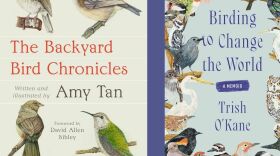Barbara J. King
Barbara J. King is a contributor to the NPR blog 13.7: Cosmos & Culture. She is a Chancellor Professor of Anthropology at the College of William and Mary. With a long-standing research interest in primate behavior and human evolution, King has studied baboon foraging in Kenya and gorilla and bonobo communication at captive facilities in the United States.
Recently, she has taken up writing about animal emotion and cognition more broadly, including in bison, farm animals, elephants and domestic pets, as well as primates.
King's most recent book is How Animals Grieve (University of Chicago Press, 2013). Her article "When Animals Mourn" in the July 2013 Scientific American has been chosen for inclusion in the 2014 anthology The Best American Science and Nature Writing. King reviews non-fiction for the Times Literary Supplement (London) and is at work on a new book about the choices we make in eating other animals. She was awarded a Guggenheim Fellowship for her work in 2002.
-
Nature's healing power is an immensely personal focus for Foster. He made his film after being burned out from long, grinding hours at work. After the release of the film, he suffered from insomnia.
-
Novelist Amy Tan's The Backyard Bird Chronicles centers on an array of birds that visit her yard, as Trish O'Kane's Birding to Change the World recalls lessons from birds that galvanized her teaching.
-
Here the New York Times columnist and author of Late Migrations and Graceland Margaret Renkl brings alive in 52 chapters her love for the animals and plants in her yard and nearby parks in Tennessee.
-
Activist Greta Thunberg was just 15 when she called on the world to take action on the climate crisis. Just as impressively, she has now pulled together essays by 100 scholars on what's needed now.
-
In his debut book Evolution Gone Wrong, Alex Bezzerides mixes the technical anatomical stuff we need to know with vivid examples and humorous phrases — in offering us some answers.
-
Harvard University's Daniel Lieberman looks at exercise from an evolutionary point of view, concluding that we evolved to limit our physical activity where possible, saving it for survival activities.
-
The anthropologist and physician teaches that the world needs not only medicine, but something more — a rejection of global racial inequalities and serious investment in the care of all people.
-
Understanding the lives of animals can illuminate our own — and those of loved adolescents too. But authors Barbara Natterson-Horowitz and Kathryn Bowers at times push cross-species links too far.
-
With details at once compelling and disturbing, geographer Jacob Shell describes the lives of the elephants of mountainous Myanmar and northeastern India that haul timber or transport people.
-
The beauty of Robert Macfarlane's writing, and of the natural world it describes, is immense. His words also act as a warning, ensuring a recognition of human harms to the environment.







